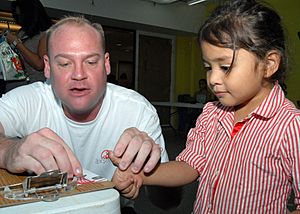Missing person facts for kids
A missing person is someone who has disappeared. Their family and friends don't know where they are or if they are alive or dead. People can go missing for many reasons. Sometimes, they choose to disappear. Other times, it's because of an accident, a crime, or getting lost.
Most missing people are found quickly. However, some cases remain unsolved for a long time. When someone goes missing, it can be very hard for their family. They often feel sad and worried. Many groups work to help find missing people. They share information and pictures. Some of these groups include the International Centre for Missing & Exploited Children (ICMEC) and the National Center for Missing & Exploited Children in the US.
Contents
Why People Go Missing
People disappear for many different reasons. Sometimes, a person decides to leave their home. Other times, they might get lost by accident. Sadly, some people are taken against their will. This could be through a kidnapping or being held somewhere.
Types of Missing Children Cases
There are different ways children can go missing. Here are some common types:
- Runaways: These are kids who leave home on their own. They might leave their house, a care home, or the people looking after them.
- Thrownaways: This happens when parents or guardians leave a child alone. They are abandoned by the adults who should care for them.
- Parental abduction: This is when a child's own parent or guardian takes them. They might take the child without permission from the other parent.
- Non-parental abduction: This is when someone who is not a parent takes a child. This could be a stranger or someone the child knows slightly.
- Missing migrant children: These are children under 18 who are traveling alone. They are separated from their parents and have no adult caring for them.
- Lost or injured children: Sometimes, children simply get lost. This can happen in busy places like a beach. They might also get hurt and cannot be found right away. This could be during sports or at a camp.
Finding Missing People
Many people think you must wait 24 hours before reporting someone missing. This is usually not true. Law enforcement agencies want you to report a missing person as soon as possible. The first 48 hours are very important. During this time, police can talk to witnesses. They can also get descriptions of suspects while memories are fresh.
Who Searches for Missing People
In most countries, the police lead missing person investigations. If someone disappears at sea, special groups like the coast guard help. Many countries also have volunteer search and rescue teams. These teams help the police look for people. Rescue groups like fire departments and mountain rescue teams also join in. They help in places that need their special skills.
Police forces try to find people quickly. They check how much danger the person might be in. They also search places the person might know or visit.
How the Public Helps
Many charities help with cases that are not solved. These include the National Center for Missing & Exploited Children in the US and Missing People in the UK. Some missing person cases are shown widely in the news. Searchers ask the public for help. Pictures of missing people might be put on posters. They can also be shown on websites and social media.
News Coverage of Missing Persons
Sometimes, the news covers missing person cases differently.
Fairness in News Coverage
Some people have noticed that news stories about missing people can be different. For example, in the US, white individuals, especially wealthy women, often get more news coverage. This is compared to people of color who go missing. Experts say that a person's background or looks might affect how much news attention they get.
For example, when Elizabeth Smart went missing, her story was in the news worldwide. She was a young white girl from a wealthy family. She was found alive after several months. But when Alexis Patterson, a young Black girl, went missing, her story only got local news. She is still missing today.
Groups like the Black and Missing Foundation work to help. They want to make sure all missing people get fair attention. They also teach minority groups about staying safe.
Focus on Stranger Kidnappings
The news often focuses on children kidnapped by strangers. However, these cases are actually very rare. Most missing children cases are not due to stranger kidnappings. In many parts of the world, most abductions are by someone the child knows. This could be a parent who doesn't have custody.
For example, in 1999 in the United States, about 800,000 children were reported missing. Most of these were runaways or taken by a family member. Only a very small number, about 115, were "stereotypical" kidnappings. These are cases where a stranger or someone the child barely knows takes them.
Global Efforts to Find Missing People
Around the world, many children go missing each year. While most are found quickly, some cases can last for months or even years. Countries and international groups are working together to help.
For example, the UNHCR reported that over 15,000 children traveling alone asked for help in Europe in 2009. These children are very vulnerable. They face high risks and need protection.

The United Nations has a group called the International Commission on Missing Persons. This group helps coordinate efforts worldwide. The International Red Cross and Red Crescent Movement also helps. They try to find people missing because of wars, disasters, or migration. They also support families who are dealing with a missing loved one.
European Hotline for Missing Children
The number 116 000 is a special hotline in Europe for missing children. It works in all 27 countries of the European Union. It also works in other countries like Albania, Serbia, Switzerland, Ukraine, and the United Kingdom. This hotline was started by Missing Children Europe.
Missing Persons in Different Countries
Many countries have their own ways of dealing with missing persons.
Austria
Austria has a special center for missing persons. The police record information about missing people. This data is stored in national and international systems. In 2019, about 85% of missing person cases in Austria were solved within a week. About 98% were solved within a year.
Australia
In Australia, over 305,000 people were reported missing between 2008 and 2015. This means about one person is reported missing every 18 minutes.
Canada
In 2007, Canadian police reported over 60,000 missing children.
Jamaica
A child-rights advocate in Jamaica asked the government for new laws. She said that about 150 children go missing every month in Jamaica. This is a big problem for a country with 2.7 million people.
Japan
It is thought that 100,000 people disappear in Japan each year. The word jouhatsu refers to people who purposely vanish from their lives without a trace.
Russia
In Russia, between 70,000 and 100,000 people go missing each year. About 25% of these cases are not solved.
Switzerland
In Switzerland, local police handle missing person reports. If an adult is found, the police can only tell others with their permission. Searching for missing people can be expensive. Helicopter searches are especially costly. Many people get lost in Switzerland due to accidents in mountain sports.
United Kingdom
In the UK, over 140,000 children go missing each year. This number was reported in 2012 by the Child Exploitation and Online Protection Centre.
United States
The US has several ways to track missing persons. The National Crime Information Center (NCIC) keeps a file of missing people. The AMBER Alert system is used for serious child abductions. In 2018, 161 AMBER Alerts were sent out. Most of these children were found.
A study in 2002 looked at missing children in 1999. It found that about 1.3 million children were missing. About 800,000 of these were reported to the police. Most of these children were runaways or lost. Only a very small number were kidnapped by strangers. By the time the study ended, almost all the children (99.8%) had been found.
See also
 In Spanish: Persona desaparecida para niños
In Spanish: Persona desaparecida para niños
- AMBER Alert
- Code Adam
- Cold case
- Forced disappearance
- Global Missing Children's Network
- International child abduction
- International Day of the Disappeared
- Lists of people who disappeared
- Mattie's Call
- National Center for Missing & Exploited Children
- National Missing Children's Day
- Unreported missing
- The Vanished (podcast)
 | George Robert Carruthers |
 | Patricia Bath |
 | Jan Ernst Matzeliger |
 | Alexander Miles |


